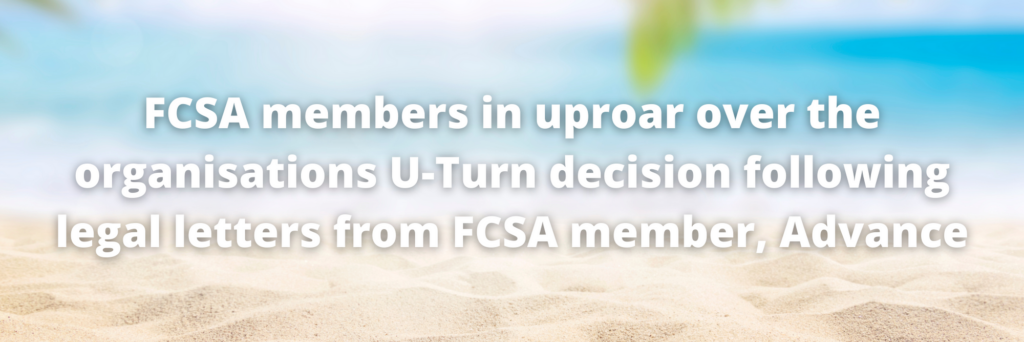Will the FCSA survive the infighting between its members and threats of legal action by its member?
An article published by ContractorUK on Monday 4th July alleged that an umbrella company (a member of the FCSA) threatened legal action against the FCSA in objection to the decisive and what would have been laudable and deliberate wording that would have meant that all Holiday Pay that a contractor is entitled to would have been paid to the contractors.
Unfortunately, internal disputes, caused by members that objected to the new intended wording in the Umbrella Code of Conduct, resulted in the unacceptable “reasonable effort” compromise that was made public on 1st July.
In disbelief and disgust, many in the sector immediately took to LinkedIn to express outrage, as the new wording means that the Holiday Pay is still open to being withheld and pocketed by umbrellas to add to their income.
But what actually happened during these discussions over legal threats and how did such a reverse occur?
An impeccable FCSA insider source has confidentially released to Contractor Voice that the FCSA fully intended to change the wording of the Umbrella Code of Conduct to ensure that absolutely no Holiday Pay could be retained by members except for exceptional circumstances (death, refusal, untraceable).
To ensure that members did not to fall foul of the Working Time Regulations (WTR), it was intended that members would be permitted to carry forward any accrued Holiday Pay for it to be paid to a contractor on termination of employment – this is both lawful, required by the WTR and morally applaudable.
The source confirms categorically that this was accepted by a majority of FCSA members, but then umbrella company Advance instructed a solicitor to prevent the FCSA making the intended changes. This resulted in the FCSA capitulating and going with a legal loophole version that an unscrupulous umbrella could, if so desired, use to pocket Holiday Pay.
Contractor Voice wonders, as no doubt will the sector, why umbrella company Advance were so opposed to the new intended wording of the Code. Do they not agree that the Holiday paid to them by the agencies was never intended to be kept by an umbrella if not paid to contractors? Will it be justifying its threatened legal action by reference to its interpretation of the WTR? Perhaps, they fully intend to repay unclaimed Holiday Pay back to agencies, for end clients, or pay it to an independent charity. Hopefully Advance will openly explain its position to the sector.
The source also reveals that this is not the first time that umbrella company Advance has threatened legal action to bend the FCSA to its desired way of operating.
It had previously been reported to Contractor Voice, following the article on the Exchequer FTT judgement, that Advance had threatened legal action against the FCSA (when under former CEO, Phil Pluck) over the intended tightening on requirements on determining Supervision, Direction or Control (SDC) status.
The source informs Contractor Voice that they objected to the FCSA’s proposed withdrawal of the fixed expenses model. The FCSA intended to withdraw the ability of members to use that model because getting it right was so complex as to be almost impossible to compliantly achieve; as seen in the Exchequer ruling, the consequences of getting it wrong could possibly lead to investigation of both the umbrella and the worker by HMRC, with huge financial consequences.
Why have Advance been so opposed to the clear intentions of the FCSA to tighten its Code in relation to the treatment of expenses. Again, perhaps Advance will explain.
It is well known to all in the sector that the manipulation of the rules in relation to contractor expenses has been rife for many years. Also, bending the rules can provide umbrellas with a significant commercial and financial advantage over others that choose to operate expenses compliantly, so as not to expose contractors to HMRC liabilities.
The source confirmed to Contractor Voice that “the downside of fixed expenses is that when a worker does not actually work (e.g., on holiday or off sick), past deductions from the assignment rate for fixed expenses cannot be paid and is therefore retained by the umbrella.” Just as with Holiday Pay, that means the end client pays on the basis that the funds are wholly intended to reach the candidate for whom they were intended.
What is next for contractors, agencies and end clients that deal with FCSA umbrellas and is it capable of survival?
With umbrella members such as Advance, JSA/Workwell and Giant, it appears on the verge of collapse, either from outside pressures that might include Government and law enforcement investigation, or from a huge build-up of internal pressure.
We hope that the current CEO (the third in as many years), Chris Bryce, is working on his promise of tightening the Code on Holiday Pay to reflect the original intention, regardless of threatened legal action by Advance.
With so much recent controversy and with contractors still open to abuse through willful exploitation of the current FCSA Codes by its members, little has changed in the last week. Contractor Voice will continue to champion the voices of contractors and lobby for change within the sector.
Update:
A spokesperson for ADVANCE said: ‘We welcome the FCSA’s statement today which acknowledges that the changes it previously proposed to its code surrounding holiday pay would have mandated its members to act unlawfully, in breach of the Working Time Regulation.
‘Although we understand and agree that the so-called ‘use it or lose it’ holiday pay situation is unsatisfactory, we were put in an invidious position that meant if we had accepted the changes to the FCSA’s code we would have been required to break the law. Other members also voiced their concerns that the suggested new code could not lawfully go ahead.
‘We want to make it absolutely clear that we do agree that the rules and regulations on holiday pay need urgent reform. We fully support the FCSA in lobbying the Government to make changes to the law that will resolve this situation to the satisfaction of the workers.’







